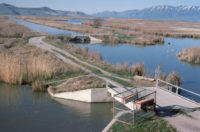The U.S. Environmental Protection Agency and the U.S. Army Corps of Engineers on Sept. 12 finalized a rule that repeals Obama-era regulations that sought to clarify which U.S. water bodies fall under federal jurisdiction and therefore require a federal Clean Water Act permit.
The action follows up on a February 2017 presidential executive order calling for a review of the Clean Water Rule enacted in 2015. EPA says the 2015 rule unlawfully expanded the definition of waters of the U.S. (WOTUS) and created a regulatory patchwork that in some cases—because of legal challenges—has required regulators to follow two sets of regulations. That patchwork created confusion and delays among landowners, agricultural interests, and builders, EPA says. EPA and the Army also plan to finalize the definition of WOTUS they first proposed in December 2018.
EPA Administrator Andrew Wheeler and Army Assistant Secretary for Civil Works R.D. James made the announcement at an event held at the National Association of Manufacturer’s headquarters on Sept. 12 and attended by officials from the National Association of Home Builders, the Associated Builders and Contractors and others.
The Army’s James said, “Before this final rule, a patchwork of regulations existed across the country as a result of various judicial decisions enjoining the 2015 Rule. This final rule re-establishes national consistency across the country by returning all jurisdictions to the longstanding regulatory framework that existed prior to the 2015 Rule, which is more familiar to the agencies, States, Tribes, local governments, regulated entities, and the public while the agencies engage in a second rulemaking to revise the definition of ‘waters of the United States.’”
Industry, business and agricultural groups cheered the announcement. But environmental advocates say they plan to file legal challenges of their own against the Trump administration’s new policy.
Stephen Sandherr, chief executive officer of the Associated General Contractors of America, said that by the decision to withdraw the “deeply flawed” 2015 rule will provide “much needed clarity for communities and officials who are working to advance vital new infrastructure, development and remediation projects across the country.” He added that he is hopeful the replacement rule will provide “the kind of certainty and common sense that the earlier measured lacked while continuing to protect water quality.”
David Bauer, president and CEO of the American Road & Transportation Builders Association, said, “The regulatory ping-pong on roadside ditches has created vast uncertainty for years with little environmental benefit.” Delay and uncertainty “only serve to increase transportation project costs.”
Michael Bellaman, president and CEO of the Associated Builders and Contractors, said in an emailed statement, “ABC supports the important goals of the Clean Water Act and is a partner in EPA’s Smart Sector program, through which the agency collaborates with regulated industries to achieve better environmental outcomes. The WOTUS rule would have caused uncertainty, confusion and conflict that would have resulted in significant delays in planning, permitting and construction without providing the hoped-for environmental benefits.”
Environmental groups, however, expressed frustration at the announcement and promised legal challenges ahead. Jon Devine, director of federal water policy at the Natural Resources Defense Council, said in a statement, “The Clean Water Rule represented solid science and smart public policy, it had protected important waterways and wetlands, providing certainty to all stakeholders.”
Earthjustice President Abigail Dillen called the repeal of the 2015 rule “shameful and dangerous. No one is above the law, including the EPA and the Army Corps of Engineers. Earthjustice will use the full strength of our nation’s bedrock environmental laws to protect communities and the environment.”
Former EPA Administrator Gina McCarthy, speaking at the Online News Association conference in New Orleans said in general of the Trump Administration's rollback of several rules that were implemented when she served under President Obama that "these are not policy decisions."
By Pam Hunter McFarland, with Pam Radtke Russell





